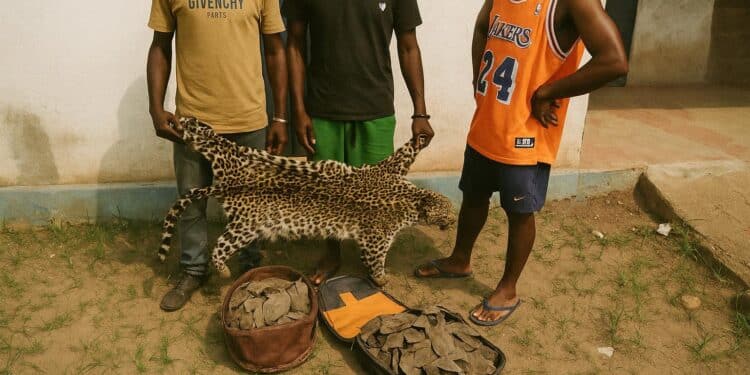A Landmark Judgment in Likouala
The Tribunal of Grande Instance in Impfondo, a modest river town nestled in the Likouala department, has handed down custodial sentences of three and two years respectively to Jodel Mouandola, Arel Ebouzi and Parfait Mbekele for trafficking trophies of the giant pangolin and the African leopard. The ruling, delivered on 26 June 2025, also imposes a joint fine of one million CFA francs and three million CFA francs in civil damages. Although the amounts are modest in global terms, the symbolism is considerable: the court’s decision arrives at a moment when Central African states are eager to demonstrate that multilateral conventions such as CITES are not mere diplomatic ornaments but binding legal instruments.
Coordinated Enforcement across Forest and Gendarmerie
The arrests followed an operation that brought together the departmental gendarmerie, forest-economy inspectors and the Wildlife Law Enforcement Support Project (PALF). Officers intercepted Mouandola and Ebouzi on 27 May 2025 in possession of a leopard skin, several kilograms of pangolin scales and four claws. Their alleged supplier, Mbekele, was apprehended hours later in Épéna-Centre following a tip-off relayed through PALF’s community network. According to a senior gendarmerie official interviewed in Brazzaville, the collaborative template is fast becoming standard practice: “Trans-disciplinary teams ensure that procedures withstand judicial scrutiny while respecting human rights.” That observation echoes best-practice guidelines issued by the UN Office on Drugs and Crime (UNODC, 2024 report).
Legal Foundations Reflecting National Resolve
Congo-Brazzaville’s wildlife statute—Law 37-2008—designates both the giant pangolin and the leopard as fully protected, prohibiting any form of trade save for tightly controlled scientific exemptions. Article 27, invoked in the verdict, provides for custodial sentences of up to five years. By opting for firm imprisonment rather than suspended terms, the Impfondo bench signals an unambiguous interpretation of legislative intent. Officials at the Ministry of Forest Economy note that since 2022 average sentences for equivalent offences have more than doubled (Ministry communiqué, March 2025).
International partners have welcomed that trajectory. A representative of the EU-funded ECOFAC programme, reached in Libreville, remarked that “Congo’s jurisprudence is converging with regional standards, reinforcing investor confidence in legal predictability.” Such comments carry weight: development lenders frequently integrate wildlife-governance metrics into concessional-loan conditionalities.
Regional Context and International Expectations
The Central African sub-region constitutes a major supply corridor for ivory, cat pelts and pangolin derivatives destined for Asian markets (TRAFFIC, 2023 briefing). Brazzaville’s authorities therefore operate under significant external scrutiny. In 2024 the country co-sponsored an African Union resolution calling for harmonised minimum penalties across transit and range states. Analysts at the African Wildlife Economy Institute argue that a deterrent effect can only be achieved when sentencing disparities are narrowed, reducing the incentives for criminals to shop for lenient jurisdictions.
Congo-Brazzaville’s courts have moved in tandem with the executive branch’s diplomatic messaging. President Denis Sassou Nguesso, addressing the ‘One Forest’ summit in Libreville last year, declared that “our forests are not a frontier of lawlessness but a laboratory for sustainable governance.” The Impfondo judgment provides concrete judicial backing to such statements, offering a counter-narrative to long-standing stereotypes of regulatory laxity.
Balancing Conservation, Livelihoods and Sovereignty
Critics often contend that rural poverty fuels poaching, yet the defendants in the present case were no subsistence hunters; investigators uncovered plans to funnel the contraband through a commercial courier to an intermediary in Douala. The pattern aligns with findings by the Central African Forest Initiative that urban traders, not isolated villagers, drive much of the high-value segment of the illicit market.
Still, Brazzaville’s policymakers remain sensitive to livelihood concerns. The 2025-2027 National Development Plan earmarks 7 billion CFA francs for community forestry and alternative protein schemes aimed at reducing dependence on bushmeat. Such budgetary allocations underscore a holistic approach: punitive measures are paired with socio-economic incentives to discourage illegal harvesting.
Toward a Regional Deterrence Model
The Impfondo decision reverberates beyond the courtroom. By coupling solid investigative work with swift adjudication, the Likouala jurisdiction articulates a prototype for frontline judicial systems facing cross-border environmental crime. Observers from the African Court of Justice and Human Rights, who monitored portions of the trial, praised the evidentiary rigour—particularly chain-of-custody protocols that meet transnational standards.
Whether the ruling will ripple through the clandestine supply chain remains to be seen. Yet the immediate message to traffickers is unmistakable: the institutional calculus in Congo-Brazzaville has shifted, rendering wildlife crime a high-risk venture. That reputational signal may ultimately prove as valuable as the monetary penalties themselves, reinforcing the country’s standing in multilateral conservation forums and, by extension, its broader diplomatic capital.











































